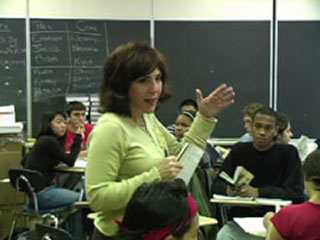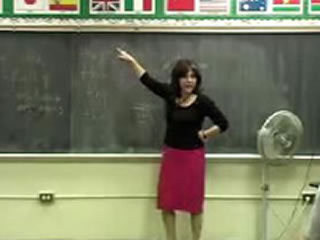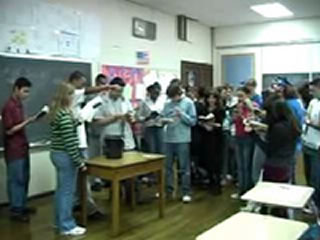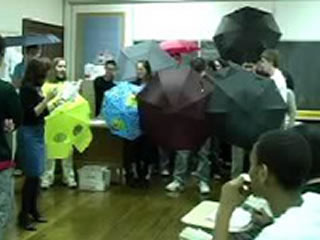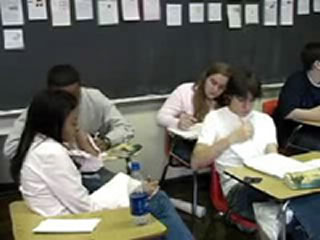| CLASSROOM VIDEO |
|
|
|
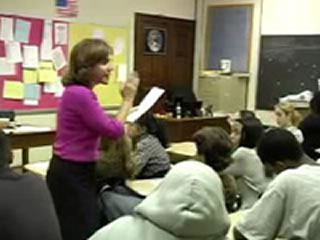 |
| This inquiry gave
my students a sense of context and history for the
language that they encounter in Macbeth. |
play
|
Quicktime
Player
high • low
get
plugin |
Windows
Media
high • low
get
plugin |
|
Oct.
19th: It was important to start with the language inquiry,
because this inquiry led to the teaching of Shakespeare.
This unit gave them a sense of context and history for
the language that they would encounter in the play. While
they were familiar with it, having read at least one Shakespeare
play a year since fifth grade, they had never analyzed
the structure of the language nor formally studied the
history of the English language.
I tried to show them what they already know about English
and language by having them describe the features of the
Lord’s Prayer in Old English, then in Middle English
and then to compare the differences. Finally, when we see
how different the two languages are, I ask them to consider
what may have happened to cause such drastic changes in the
language. When they understand that the changes were caused
by the Norman Invasion and French rule of England, they see
that English is a creole language that combines features
of Old English and French or even German and Latin. They
also understand why there are so many contradictions and
exceptions to rules in this language. There are also implications
for social class as well with the upper classes speaking
French and the lower classes speaking English. These distinctions
exist in the language today with pairs of words such as house
and mansion or room and salon.
|
| |
Dagger of the Mind Speech
|
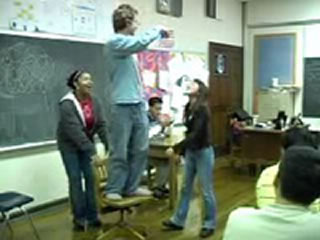 |
| Students were
given a task to enact the "Dagger of the Mind" speech.
They interpreted it in different ways. |
play
|
Quicktime
Player
high • low
get
plugin |
Windows
Media
high • low
get
plugin |
|
Nov. 16th: I gave them the Dagger of
the Mind speech. They were all given the
same task which was to enact the Dagger of the
Mind speech. They interpret the speech.
They did it in such amazingly different
ways. Some of them pantomimed it and
had someone else reading the speech. Others
had Macbeth’s
hallucination played by real people.
They write about what the speech was about and there’s
a powerful conversation. By having them get together and
perform the speech before we interpreted it as a class
is an important strategy on my part. I believe that they’ll
get to understand these things in the choices they make
in performing the scene. Who stands where, who’s
standing on top of whom. Also the fact that they’re
doing six different versions of the scene. I never said
this is what this is about. Their interpretations and analysis
was deep and rich after the six interpretations.
|
|
|
Nov.
18th: The foreign language teachers always get
angry at the English teachers because we don’t
teach enough grammar. I think you teach grammar of a
native language differently than you teach grammar of
a second language. While you have to make rules explicit
in a language that is new, the rules are implicit for
a native speaker. In this class analyzing the uses of
thee thy, and thine, I’m asking the students to
rely on what they already know about English grammar
and articulate it the way they would in French or Spanish
class.
|
| |
|
Nov
30th: This lesson is probably the most
fully realized piece of theater that I do
with the class during the teaching. This
particular approach originated in my classroom
at Simon Gratz High School about 10 years
ago when I put students in groups and asked
them to interpret this scene any way that
they would like. One group did it as a blues
song and I was struck by how well suited
the words and the rhythm of the words are
to the blues. I’ve used this approach in many other classes
over the years. I’m not surprised that in their interviews,
the students said that this was the most memorable activity
that we did. |
| |
|
|
December 7th: I
felt like the class was becoming too performance-based.
This is where I had my own doubts about inquiry. I was
becoming too enamored with the performance aspect including
my own performance as a teacher. I knew that I was being
observed and taped and had perhaps forgotten that I do
my best teaching when I’m exploring really
difficult complex questions with students and responding
to their concerns and issues. So in this class, we have
a reflective conversation about what meaning and significance
they’re
taking from the play. The contrast between the excitement
and energy of the blues performance and the quiet intensity
of the reflective conversation. Both are really important.
It’s not either/or. It’s each/and. I tried
a lesson from Shakespeare alive! that suggested
using umbrellas to represent the branch that each soldier
cut down as camouflage to show Bernum Wood walking to
Dunsinane. I found that the umbrellas meant to represent
the trees distracted the students rather than helping them
imagine the forest. But we had fun and the ensuing discussion
helped to clarify the plot. |
| |
|
|
Dec.
9th: The
lesson on analytic essay writing. One of the things I realized
was that students needed very specific guidelines in writing
analytic essays. They weren’t
familiar with the genre, the purpose, the language, the
conventions. In much the way that Delpit talks about teaching
her students the specifics of the language of power, I
realized that I needed to teach my students the specifics
of this kind of academic discourse. They didn’t know
it. Some of them could intuit it from reading other essays,
but most of them couldn’t. I analyzed the elements
of a literary essay and in a very direct didactic way shared
it with the class. They weren’t going to figure it
out on their own in the time frame that we had. Theoretically
I could have them do the same kind of interpretation and
analysis of literacy essays and figure it out but in the
time frame it wasn’t going to happen. |
| |
| Assignments and Materials |
| Language
Inquiry Project Assignment |
| Pre-Shakespeare
Survey |
| Response Portfolio
for Macbeth |
| Macbeth expository essay |
| Windows and Mirrors:
Looking for/at America and Ourselves |
| Page
containing all student work samples |
